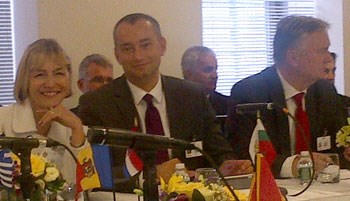- Published: 28.09.2012.
Pusić attends informal ministerial-level SEECP meeting, meetings on religious tolerance and capital punishment abolition
Pusić participated in the meeting themed “Civil Society and Human Rights Education as Means of Promoting Religious Tolerance”, organized by Italian and Indonesian foreign ministers Giulio Terzi and Marty Natalegawa. The goal of the initiative is to promote religious tolerance, freedom of belief and the protection of religious minorities, as well as extend support to programmes of the civil society organizations dealing with human rights.
The Croatian foreign minister expressed support for the initiative, adding that religious tension played a major role in numerous conflicts worldwide, and is often used among political opponents as means of spreading hate and intolerance. “Tolerance, non-discrimination and full respect for the freedom of expression are the best way to strengthen religious tolerance and fight the curbing of religious freedom,” Pusić said. “Education in human rights and their role in society are crucial,” she said, adding that Croatia had recently introduced civil society education in its curricula, combining human rights and proactive participation in decision making. She emphasized that cooperation between the state, religious communities and civil society was paramount in promoting common values.
Pusić also attended the ministerial-level meeting titled “Capital Punishment: from Moratorium to Abolition”, organized by France and Benin, inviting the UN member states to consider moratorium on the death penalty and take steps towards its abolishment. Since 2007, Croatia has been one of the principal co-sponsors and one of the initiators of the first resolution on the death penalty moratorium. Pusić said Croatia strongly supported the abolition of capital punishment, which is in accordance with our laws, stressing that we were against it in all cases and circumstances. “We believe that abolishing the death penalty is necessary to protect human dignity and human rights”, she said, adding that experience had taught us that the death penalty did not prevent criminal act, nor did it bring justice to the victims.
On the fourth day of her stay in New York for the UN General Assembly, Pusić attended an informal ministerial-level meeting of SEECP members together with Macedonia’s Poposki, Turkey’s Davutoglu, Romania’s Corleanu, Slovenia’s Erjavec, Montenegro’s Kaluđerović, Bulgaria’s Mladenov, Bosnia and Herzegovina’s Lagumdžija, Albania’s Panariti, representatives of Greece and Moldova, and Regional Cooperation Council Secretary General Hido Biščević. The participants expressed support to the European prospects of the countries in the region, pointing out that stability was crucial for the prosperity of Europe’s southeast. Pusić stressed the importance of mutual support within the region, “not because we are generous, but because it is in our natural interest.” “Croatia knows from its own experience that the negotiations process is important first and foremost in terms of state institution building, and then in terms of the EU membership”, Pusić said. Macedonian Foreign Minister Poposki, whose country assumed presidency over SEECP, presented the presidency programme. Press releases
The Croatian foreign minister expressed support for the initiative, adding that religious tension played a major role in numerous conflicts worldwide, and is often used among political opponents as means of spreading hate and intolerance. “Tolerance, non-discrimination and full respect for the freedom of expression are the best way to strengthen religious tolerance and fight the curbing of religious freedom,” Pusić said. “Education in human rights and their role in society are crucial,” she said, adding that Croatia had recently introduced civil society education in its curricula, combining human rights and proactive participation in decision making. She emphasized that cooperation between the state, religious communities and civil society was paramount in promoting common values.
Pusić also attended the ministerial-level meeting titled “Capital Punishment: from Moratorium to Abolition”, organized by France and Benin, inviting the UN member states to consider moratorium on the death penalty and take steps towards its abolishment. Since 2007, Croatia has been one of the principal co-sponsors and one of the initiators of the first resolution on the death penalty moratorium. Pusić said Croatia strongly supported the abolition of capital punishment, which is in accordance with our laws, stressing that we were against it in all cases and circumstances. “We believe that abolishing the death penalty is necessary to protect human dignity and human rights”, she said, adding that experience had taught us that the death penalty did not prevent criminal act, nor did it bring justice to the victims.
On the fourth day of her stay in New York for the UN General Assembly, Pusić attended an informal ministerial-level meeting of SEECP members together with Macedonia’s Poposki, Turkey’s Davutoglu, Romania’s Corleanu, Slovenia’s Erjavec, Montenegro’s Kaluđerović, Bulgaria’s Mladenov, Bosnia and Herzegovina’s Lagumdžija, Albania’s Panariti, representatives of Greece and Moldova, and Regional Cooperation Council Secretary General Hido Biščević. The participants expressed support to the European prospects of the countries in the region, pointing out that stability was crucial for the prosperity of Europe’s southeast. Pusić stressed the importance of mutual support within the region, “not because we are generous, but because it is in our natural interest.” “Croatia knows from its own experience that the negotiations process is important first and foremost in terms of state institution building, and then in terms of the EU membership”, Pusić said. Macedonian Foreign Minister Poposki, whose country assumed presidency over SEECP, presented the presidency programme.



